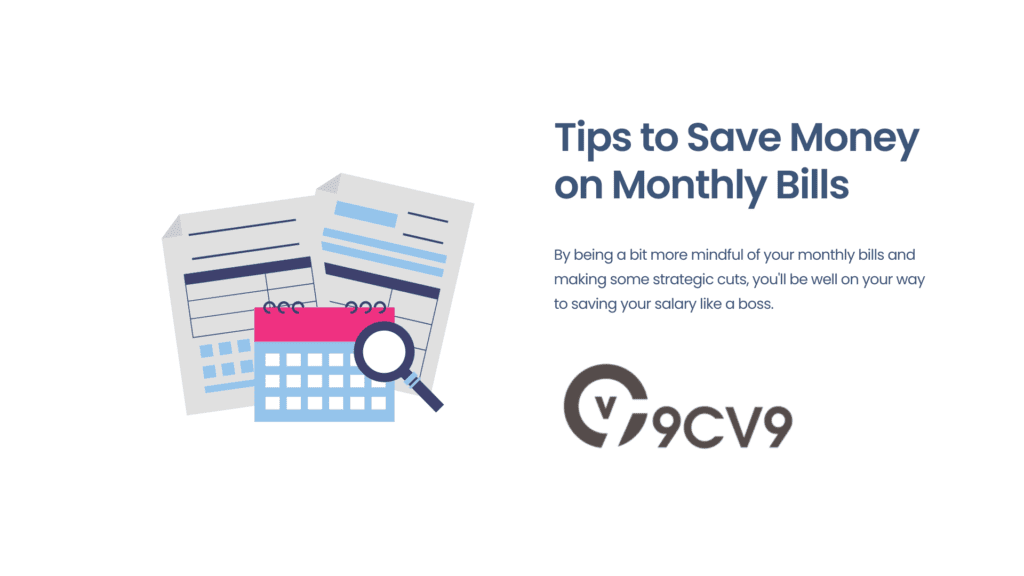Key Takeaways
- Set achievable savings goals and track your progress to stay motivated and on track.
- Be mindful of your expenses and look for ways to save on bills, groceries, dining out, and transportation.
- Avoid common mistakes like overspending on unnecessary items and failing to plan for emergencies. With the right habits and strategies, you can save your salary and achieve your financial goals.
Welcome to the Ultimate Guide to Saving Your Salary: Tips and Tricks.
We all know the feeling of being broke by the end of the month, wondering where all our hard-earned cash went. We vow to do better next month, but the same thing happens again and again.
It’s a vicious cycle.
But fear not.
You don’t have to live paycheck to paycheck forever.
With a few simple tips and tricks, you can start saving your salary and reach financial stability.
And the best part?
You don’t have to give up your daily caffeine fix or Netflix binges.

Saving money can be a daunting task, especially when it feels like there’s always something else to spend it on.
But by following the tips and tricks in this guide, you’ll be well on your way to building up your savings account and achieving your financial goals.
Now, before we dive into the nitty-gritty of saving, let’s take a moment to appreciate the joy of spending money.
Who doesn’t love the feeling of buying something new and shiny?
Whether it’s a new pair of shoes, the latest gadget, or a spontaneous weekend getaway, spending money can be pretty darn satisfying.
But let’s be real, that high only lasts so long.
And when the credit card bills start piling up, the stress and anxiety can quickly take over.
So, instead of relying on material possessions to bring us happiness, let’s focus on the long-term benefits of saving.
Think about it.
By saving your salary, you can afford to take that dream vacation, buy a home, or start your own business.
You can also build up an emergency fund to protect yourself against unexpected expenses or a job loss.
So, are you ready to start saving your salary like a pro?
Great.
Let’s dive into the ultimate guide to saving your salary, where we’ll share tips and tricks that are both practical and fun (yes, you read that right).
Get ready to say goodbye to the paycheck-to-paycheck life and hello to financial stability.
Before we venture further into this article, we like to share who we are and what we do.
About 9cv9
9cv9 is a business tech startup based in Singapore with a strong presence worldwide.
With over six years of startup and business experience, and being highly involved in connecting with thousands of companies and startups, the 9cv9 team has listed some important learning points in this overview of how to save your salary and paycheck.
If you are looking for a high-salary job or for a remote job, then hop over to 9cv9 Job Portal to find your next job and internship.
The Ultimate Guide to Saving Your Salary: Tips and Tricks
- Set a Savings Goal
- Analyze your Current Expenses
- Tips to Save Money on Monthly Bills
- Strategies to Save on Groceries and Dining Out
- Saving Money on Transportation
- Maximizing your Savings
- Avoiding Common Mistakes when Saving Money
1. Set a Savings Goal

Ah, goal setting.
It’s one of those things that sounds so simple in theory, but can be a real pain in the you-know-what to actually execute.
But when it comes to saving your salary, setting a goal is an essential first step.
So, how do you set a savings goal?
Well, the first step is to determine what you’re actually saving for.
Are you trying to build an emergency fund?
Save for a down payment on a house?
Or maybe you just want to finally afford that Hawaiian vacation you’ve been dreaming about since high school.
Whatever it is, write it down.
Yes, pen and paper.
Or use a fancy digital tool if that’s more your style.
The important thing is to have a clear idea of what you’re working towards.
Now, let’s break down that big, scary goal into smaller, more manageable chunks.
If your goal is to save $10,000, for example, that can feel pretty overwhelming.
But if you break it down into smaller targets, like saving $500 a month, it suddenly seems a lot more doable.
Next, track your progress towards your goal.
This can be as simple as keeping a spreadsheet or using a budgeting app that shows you how much you’ve saved so far.
Celebrate your small victories along the way, too.
Maybe you hit your first $1,000 milestone, or you managed to save an extra $100 this month.
Treat yourself to a small reward (emphasis on small) to keep yourself motivated.
Of course, life happens, and sometimes we have to adjust our goals.
Maybe you had an unexpected expense pop up, or your income decreased.
That’s okay. Just revisit your goal and adjust it accordingly.
The key is to keep moving forward, even if it’s at a slower pace than you originally planned.
So, in summary: write down your goal, break it down into manageable chunks, track your progress, celebrate your victories, and adjust as needed.
By setting a savings goal, you’ll have a clear idea of what you’re working towards and stay motivated to keep going.
You got this.
2. Analyze your Current Expenses

If you’re like most people, you probably have a vague idea of where your money goes each month.
You know you pay rent, buy groceries, and maybe indulge in the occasional online shopping spree.
But if you want to save your salary, it’s time to get real about where your money is actually going.
Start by gathering all your bank statements and credit card bills from the past few months.
Yes, this may be a painful process.
But trust us, it’s worth it.
Now, go through each statement and categorize your expenses.
How much are you spending on rent or mortgage payments?
How much on food and dining out?
How much on entertainment, clothing, and other miscellaneous expenses?
Once you have a clear breakdown of your expenses, it’s time to identify areas where you can cut back.
Are you spending too much on eating out?
Maybe it’s time to start cooking more meals at home.
Do you have subscriptions to services you’re not using? Cancel them.
But here’s the thing: cutting back on expenses doesn’t have to be all doom and gloom.
In fact, it can be pretty fun.
Get creative with ways to save money.
Host a potluck dinner with friends instead of going out to eat.
Swap clothes with a friend instead of buying new ones.
The possibilities are endless (and often hilarious).
Of course, there are some expenses that are non-negotiable, like rent and utilities.
But even here, there may be ways to save.
Can you negotiate a lower rent with your landlord?
Can you switch to a cheaper phone plan?
It never hurts to ask.
One final tip: don’t forget to factor in irregular expenses, like car repairs or medical bills.
Set aside a portion of your salary each month for these expenses, so you’re not caught off guard when they inevitably happen.
By analyzing your current expenses and identifying areas where you can cut back, you’ll be well on your way to saving your salary like a pro.
And who knows, you may even discover some fun and creative ways to live more frugally.
3. Tips to Save Money on Monthly Bills

Ah, monthly bills.
The necessary evil that drains our bank accounts each month.
But fear not, my financially savvy friend.
There are plenty of ways to save money on those pesky bills.
First up, let’s tackle your cable and internet bill.
Do you really need all those premium channels and lightning-fast internet speeds?
Probably not.
Call your provider and see if you can downgrade your plan to a more basic (and cheaper) package.
And if you’re feeling really bold, consider cutting the cord altogether and switching to a streaming service.
Next, let’s talk about your utility bills.
Are you leaving lights on all day?
Cranking up the heat in the winter and blasting the AC in the summer?
Try being a bit more mindful of your energy usage.
Turn off lights when you leave a room, adjust your thermostat to a more moderate temperature, and unplug appliances when you’re not using them.
Now, let’s move on to your phone bill.
Are you paying for a bunch of services you don’t actually need?
Check your plan and see if you can switch to a more basic option.
And if you’re in the market for a new phone, consider buying a refurbished model instead of shelling out for the latest and greatest.
Finally, let’s talk about your insurance bills.
This one may not be as exciting as cutting the cable cord, but it’s important nonetheless.
Do some comparison shopping and see if you can find a better deal on your car, home, or life insurance.
And don’t be afraid to negotiate with your current provider – sometimes all it takes is a little haggling to score a lower rate.
And if all else fails, remember the golden rule of bill paying: always pay on time.
Late fees can add up quickly and undo all your hard work in saving money on your bills.
By being a bit more mindful of your monthly bills and making some strategic cuts, you’ll be well on your way to saving your salary like a boss.
Plus, think of all the extra cash you’ll have to spend on more exciting things, like that Hawaiian vacation we mentioned earlier.
4. Strategies to Save on Groceries and Dining Out

Let’s face it, groceries and dining out can be major money suckers.
But with a bit of strategy, you can save some serious cash without sacrificing delicious meals.
First up, let’s talk about groceries.
One of the easiest ways to save money at the grocery store is to shop with a list and stick to it.
Don’t get lured in by those fancy displays or buy things you don’t actually need.
And be sure to check your pantry and fridge before you head to the store – you may already have some ingredients on hand.
Another tip: consider buying generic or store-brand products instead of name-brand items.
The difference in quality is often negligible, but the savings can be significant.
And don’t be afraid to shop at discount stores or buy in bulk – just be sure to compare prices to make sure you’re getting the best deal.
Now, let’s talk about dining out.
It’s tempting to indulge in fancy meals at expensive restaurants, but that’s a surefire way to blow your budget.
Instead, look for deals and specials at local restaurants.
Many places offer happy hour discounts, early bird specials, or even free appetizers with your meal.
Another strategy: skip the drinks.
Alcohol can be a major expense at restaurants, so opt for water or a non-alcoholic beverage instead.
And don’t be afraid to split an entree or order appetizers instead of a full meal – you can still enjoy a delicious meal without breaking the bank.
If you’re really feeling ambitious, consider learning to cook some of your favorite restaurant dishes at home.
You’ll save money and impress your friends with your newfound culinary skills.
Plus, think of all the money you’ll save on tips and taxes.
By using these strategies to save on groceries and dining out, you’ll be well on your way to saving your salary like a pro.
And who knows, you may even discover some new favorite recipes or restaurants along the way.
5. Saving Money on Transportation

Transportation is a necessity for most of us, but it can also be a major expense.
Whether you’re commuting to work or running errands around town, there are plenty of ways to save money on transportation.
First up, let’s talk about your car.
If you’re in the market for a new ride, consider buying a used car instead of a brand new one.
The difference in price can be significant, and you may be able to find a reliable vehicle that meets your needs.
And if you already have a car, be sure to keep up with regular maintenance to prevent costly repairs down the road.
Another tip: carpool with coworkers or friends to split the cost of gas and parking.
Not only will you save money, but you’ll also reduce your carbon footprint.
And if you live in a city with good public transportation, consider taking the bus or train instead of driving.
You may even be able to work or read during your commute, making the time fly by.
Now, let’s talk about biking.
If you live in a bike-friendly city, consider ditching the car altogether and investing in a bike.
You’ll save money on gas, parking, and maintenance, plus you’ll get a great workout in the process.
Just be sure to wear a helmet and follow the rules of the road.
And if all else fails, consider walking.
It may not be the fastest or most convenient option, but it’s definitely the cheapest.
Plus, you’ll get some fresh air and exercise while you’re at it.
One final tip: don’t forget about ride-sharing apps like Uber and Lyft.
While these services may not always be the most cost-effective option, they can be a lifesaver in a pinch.
Just be sure to check for discounts and promo codes before you book your ride.
By using these strategies to save money on transportation, you’ll be well on your way to saving your salary like a champ.
Plus, think of all the extra cash you’ll have to spend on fun activities, like a road trip or a fancy dinner out.
6. Maximizing your Savings

Congratulations, you’ve successfully implemented all of our tips and tricks for saving money.
But don’t rest on your laurels just yet – there are still plenty of ways to maximize your savings and stretch your salary even further.
First up, let’s talk about setting up a budget.
By tracking your expenses and income, you’ll be able to identify areas where you can cut back and put more money towards your savings goals.
Plus, having a budget will give you a better understanding of your overall financial picture.
Another tip: automate your savings.
By setting up automatic transfers from your checking account to your savings account, you’ll be less likely to spend that money on non-essentials.
And if your employer offers a retirement plan, like a 401(k), be sure to take advantage of it.
Not only will you be saving for the future, but you may also be eligible for employer contributions or tax benefits.
Now, let’s talk about maximizing your savings through investing.
While it can be intimidating to navigate the world of stocks and bonds, there are plenty of resources available to help you get started.
Consider working with a financial advisor or using a robo-advisor service to help you make smart investment decisions.
And if you’re feeling really ambitious, consider starting a side hustle to earn some extra cash. Typically, you can start with Jobsrefer as a freelance referrer.
Whether it’s freelancing, dog walking, or selling crafts on Etsy, there are plenty of ways to turn your skills and passions into a profitable venture.
And who knows, it may even turn into a full-time gig down the road.
One final tip: don’t forget to treat yourself every now and then.
While it’s important to save money and be responsible with your finances, it’s also important to enjoy life and have fun.
So go ahead and splurge on that fancy dinner or concert tickets – just be sure to budget for it and enjoy it guilt-free.
By following these tips to maximize your savings, you’ll be well on your way to achieving your financial goals and living your best life.
So go ahead, treat yourself – you deserve it!
7. Avoiding Common Mistakes when Saving Money

Saving money can be a tricky business, and it’s easy to fall into common traps and make mistakes that can derail your efforts.
But fear not – we’ve compiled a list of the most common mistakes people make when saving money, and how you can avoid them.
First up, let’s talk about setting unrealistic goals.
While it’s important to have a savings goal in mind, it’s equally important to be realistic about what you can achieve.
Setting an unattainable goal can lead to frustration and burnout, and may even cause you to give up altogether.
Instead, start with small, achievable goals and work your way up from there.
Another mistake people make is not tracking their spending.
It’s easy to lose track of where your money is going, especially if you’re using credit cards or online shopping.
By keeping track of your expenses, you’ll be able to identify areas where you can cut back and put more money towards your savings goals.
Now, let’s talk about not prioritizing debt repayment.
While it may be tempting to focus all your efforts on saving money, it’s important to pay off any high-interest debt first.
This will not only save you money in the long run, but it will also improve your credit score and give you a sense of financial freedom.
Another common mistake is not taking advantage of free money.
Whether it’s employer matching contributions to your retirement plan or cashback rewards on your credit card, there are plenty of ways to get extra money without any extra effort.
Be sure to take advantage of these opportunities whenever possible.
One final mistake to avoid: not planning for emergencies.
While it’s great to have a savings cushion for planned expenses like a vacation or a new car, it’s equally important to have an emergency fund for unexpected expenses like medical bills or a job loss.
Aim to have at least three to six months’ worth of living expenses saved up in an easily accessible account.
By avoiding these common mistakes when saving money, you’ll be well on your way to achieving your financial goals and living your best life.
And who knows, you may even become a savings guru and inspire others to follow in your frugal footsteps.
Conclusion
There you have it, folks – the ultimate guide to saving your salary.
We hope you’ve found this post helpful, informative, and maybe even a little bit entertaining.
Saving money can be a daunting task, but with the right tips and tricks, it can also be a rewarding and satisfying experience.
Remember, saving money is all about creating good habits and making small, consistent changes to your lifestyle. It’s not about depriving yourself of the things you love, but rather finding ways to enjoy them without breaking the bank.
By setting achievable goals, tracking your spending, and being mindful of your expenses, you’ll be well on your way to financial freedom.
And don’t forget to celebrate your successes along the way.
Whether it’s reaching a savings milestone or finding a great deal on something you’ve been eyeing, take a moment to pat yourself on the back and revel in your frugal victories.
We hope you’ve enjoyed reading this post as much as we’ve enjoyed writing it.
And who knows, maybe you’ll even become a savings expert and start sharing your own tips and tricks with friends and family.
Whatever your journey may be, remember that every little bit counts, and with a little determination and creativity, you can save your salary and achieve your financial goals.
If you find this article useful, why not share it among your business manager and HR director counterparts, and also leave a nice comment below?
We at the 9cv9 Research Team strive to bring the latest and most meaningful data, guide, and statistics to your doorstep.
Also, read some of our awesome articles:
Quiet Promotions: What it is and How to Overcome it?
The Pros of Virtual Internships: What You Need to Know (Updated in 2023)































![Writing A Good CV [6 Tips To Improve Your CV] 6 Tips To Improve Your CV](https://blog.9cv9.com/wp-content/uploads/2020/06/2020-06-02-2-100x70.png)


